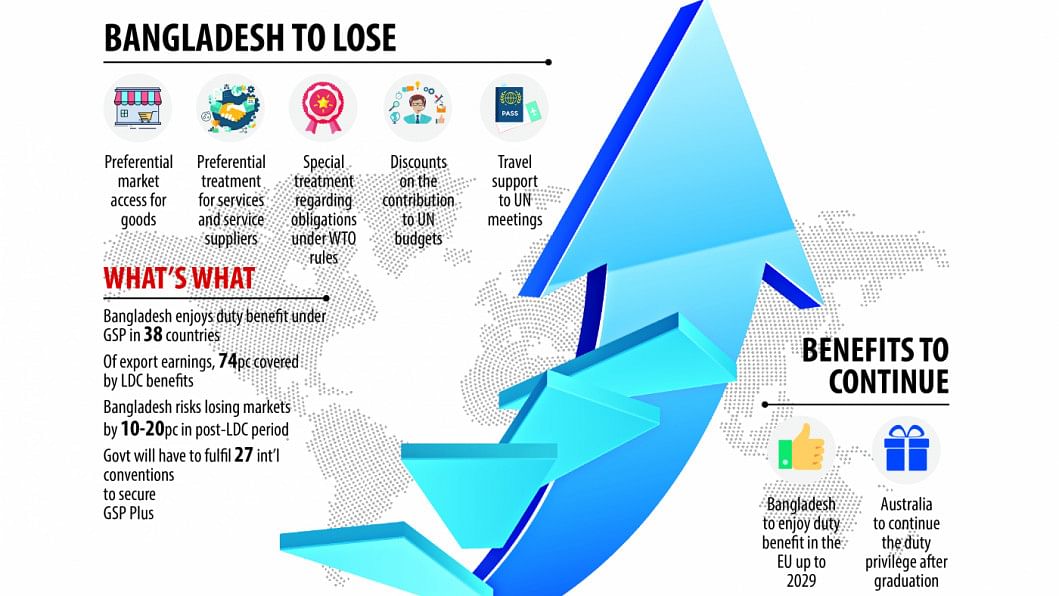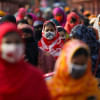No major progress in post-LDC preparation

Bangladesh is yet to make any significant progress in its preparation to retain duty preference set to be withdrawn once it graduates from the group of the least-developed countries (LDCs).
Riding on steady economic growth and social sector gains, the country is on its course to becoming a developing country in 2026.
With this, Bangladesh will lose its duty-free access in major markets and other benefits it enjoyed since its inclusion to the group in 1975.
LDCs benefit from a number of dedicated international support measures in the areas of trade, official development assistance and others, including travel support to United Nations meetings and reduced budgetary contributions to international organisations.
After graduation, countries no longer benefit from these support measures, according to the LDC portal of the UN. The vast majority of development partners, however, continue to support countries even after they have graduated.
As time is running out fast, Bangladesh has moved to sign free trade agreements (FTAs) and preferential trade agreements (PTAs) with major trading partners to retain the duty benefit.
In its Eighth Five Year Plan and the Export Policy for 2021-24, the government said it plans to sign FTAs and PTAs with major trading partners.
Bangladesh has, so far, been able to strike a PTA with Bhutan. And talks are underway to ink the Comprehensive Economic Partnership Agreement (CEPA) with India.
The government plans to pen trade deals with India, China, Malaysia, Vietnam, Japan, and the countries under the Association of South-East Asian Nations (Asean), the Regional Comprehensive Economic Partnership (RCEP) and the Comprehensive and the Progressive Agreement for Trans-Pacific Partnership (CPTPP).
Some high-powered committees have been formed to address the issues related to graduation. The government is in talks with some major trading partners to sign trade agreements.
"Bangladesh has taken a lot of preparation in terms of policies. Now is the time to implement the plans to face the challenges of the graduation," said Mustafizur Rahman, a distinguished fellow of the Centre for Policy Dialogue.
M A Razzaque, research director of the Policy Research Institute, also called for the proper execution of the policies in order to ensure a smooth transition from the group.
The country has become a manufacturing hub, particularly for garment items, on the back of trade benefits.
But because of the lacklustre preparation, Bangladesh risks losing markets by 10 to 20 per cent in the post–LDC period because of the end of duty preference.
Currently, Bangladesh enjoys duty benefits under the Generalised System of Preferences (GSP) in 38 countries. Of the total export earnings, 74 per cent is covered by the benefits granted to LDCs.
So, if the total earnings of $38.75 billion registered in the last fiscal year are taken into account, $28.67 billion worth of external businesses may be affected if proper steps are not taken on time.
For example, local suppliers will come under tough competition in the EU, the largest export destination of Bangladesh accounting for 60 per cent of the goods shipped from the country, if the duty benefit can't be retained.
Studies suggest that the country may lose $4 billion in garment exports alone in the EU annually since suppliers will face a 12 per cent duty in the bloc owing to the graduation.
It will pile up pressure on exporters since Vietnam, a major competitor of Bangladesh, enjoys the zero-duty benefit in the EU thanks to its signing of an FTA.
Bangladesh will have to fulfil 27 international conventions, including four core ones – improved human rights, labour rights, good governance and environmental protection – to secure GSP Plus status, which will guarantee the duty benefit.
"The government should also try to join hands with some mega trading blocs like the RCEP and the Asean to attain the duty benefit in the post-LDC period," said Razzaque.
He says the global situation is changing very fast and everything is depending on markets.
For instance, once it was assumed that Myanmar would be a major source of garments for international retailers and brands. But work orders are shifting to Bangladesh from the crisis-hit Southeast Asian nation.
Orders are also relocating from China, the world's biggest garment exporter, owing to the rising costs, among other factors.
"So, Bangladesh may not be greatly affected in the post-LDC period," Razzaque said.
Still, a continuation of the preferential duty is crucial for any developing nation. Two instances can clearly explain why.
First, Bangladesh has become the second-largest garment exporter in the world riding on the duty benefit. This has allowed the country to lift its share in the global apparel market to 6.8 per cent.
Second, Bangladesh's garment export was hovering around $1 billion thanks to the zero-duty facility in Turkey. The shipment declined to $117.15 million in the last fiscal year because of the 17.50 per cent duty slapped on Bangladesh's textile and garment items in June 2012.
"Bangladesh also needs to develop the private sector, special economic zones and skills," said Razzaque.
The government is set to publish its paper on the progress related to preparation from the LDC group today.
Recently, Tapan Kanti Ghosh, senior secretary of the commerce ministry, said the government is negotiating with some major trading partners to sign FTAs, PTAs and CEPAs to retain the duty benefits.
"We are not worried about the challenges of the LDC graduation as we are taking good measures."
Bangladesh will enjoy duty benefits in the EU up to 2029 as the bloc has extended three years additionally as a grace period.
"By this time, the country will be ready to attain the GSP Plus status by improving the working environment and meeting other conditions," said the secretary.
Australia recently said it will continue the duty privilege to Bangladesh after graduation.
Moreover, negotiation is underway through the World Trade Organisation (WTO) for the extension of the LDC-related duty privileges for the graduating countries for 12 more years.
"I am hopeful that the WTO will take measures to extend the duty privileges at least for six years," said Ghosh.
The secretary, who is also a member of the government's high-powered LDC graduation committee, admits that the most important issue is the diversification of products.
Bangladesh's export is largely dominated by the shipment of garment items, which account for around 85 per cent of national receipts.
Garment exporters are, however, performing strongly in the US despite 15.62 per cent duty in the absence of the GSP and the volatile global scenario.
Apparel shipment to the US surged 50 per cent year-on-year to $5.78 billion in the July-February period, data from the Export Promotion Bureau showed.
It is expected that the garment export to the US will touch $10 billion in the current fiscal year, ending in June, because of higher demand.

 For all latest news, follow The Daily Star's Google News channel.
For all latest news, follow The Daily Star's Google News channel. 







Comments